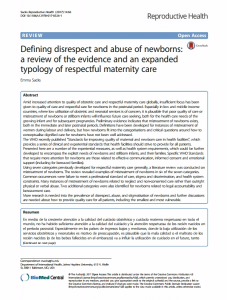
Amid increased attention to quality of obstetric care and respectful maternity care globally, insufficient focus has been given to quality of care and respectful care for newborns in the postnatal period. Especially in low and middle income countries, where low utilisation of obstetric and neonatal services is of concern, it is plausible that poor quality of care or mistreatment of newborns or stillborn infants will influence future care seeking, both for the health care needs of the growing infant and for subsequent pregnancies. Preliminary evidence indicates that mistreatment of newborns exists, both in the immediate and later postnatal periods. Definitions have been developed for instances of mistreatment of women during labour and delivery, but how newborns fit into the categorisations and critical questions around how to conceptualise dignified care for newborns have not been well addressed.
The WHO recently published “Standards for improving quality of maternal and newborn care in health facilities”, which provides a series of clinical and experiential standards that health facilities should strive to provide for all patients. Presented here are a number of the experiential measures, as well as health system requirements, which could be further developed to encompass the explicit needs of newborns and stillborn infants, and their families. Specific WHO Standards that require more attention for newborns are those related to effective communication, informed consent and emotional support (including for bereaved families).
Using seven categories previously developed for respectful maternity care generally, a literature review was conducted on mistreatment of newborns. The review revealed examples of mistreatment of newborns in six of the seven categories. Common occurrences were failure to meet a professional standard of care, stigma and discrimination, and health system constraints. Many instances of mistreatment of newborns related to neglect and non-consented care rather than outright physical or verbal abuse. Two additional categories were also identified for newborns related to legal accountability and bereavement care.
More research is needed into the prevalence of disrespect, abuse, and stigmatisation of newborns and further discussions are needed about how to provide quality care for all patients, including the smallest and most vulnerable.